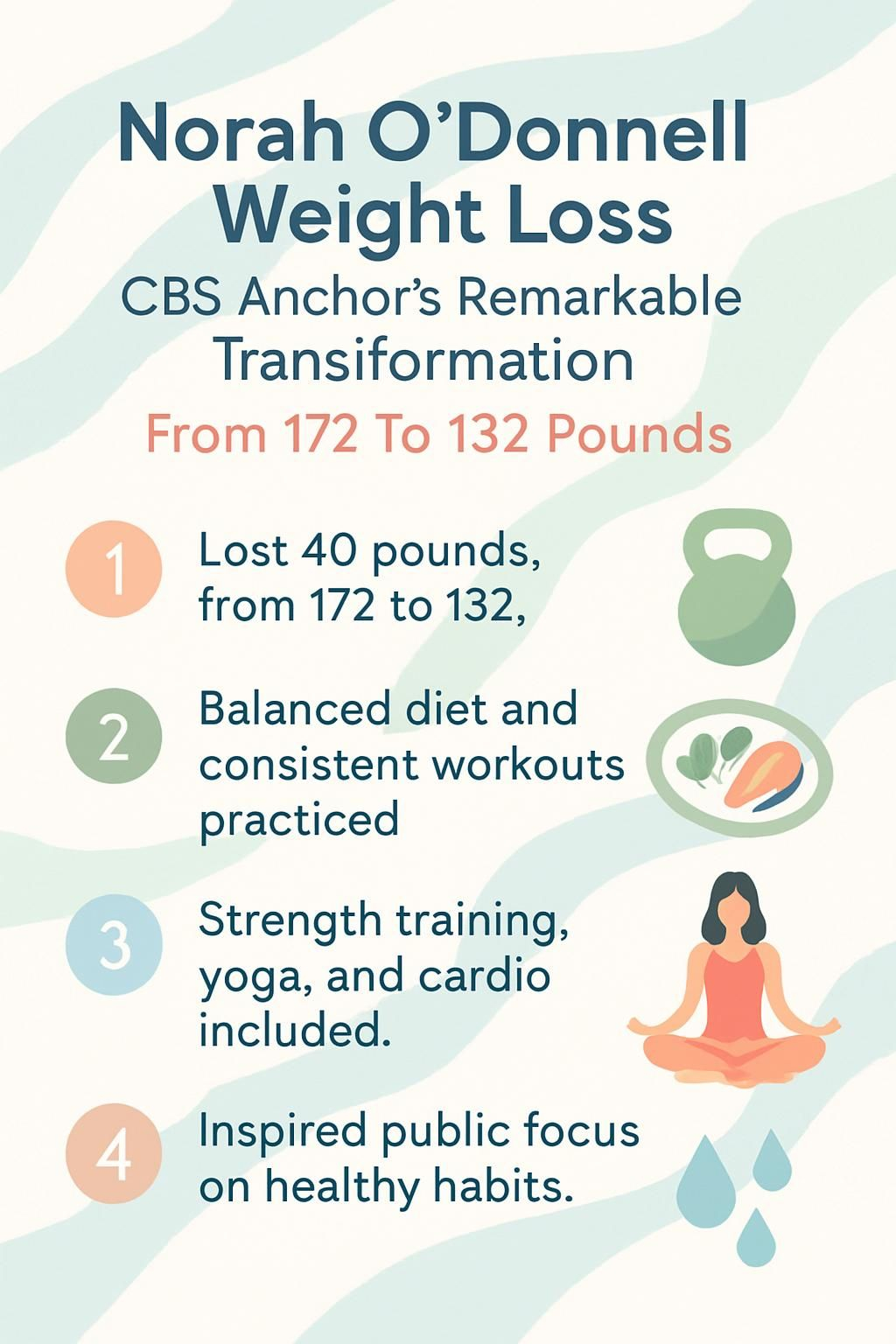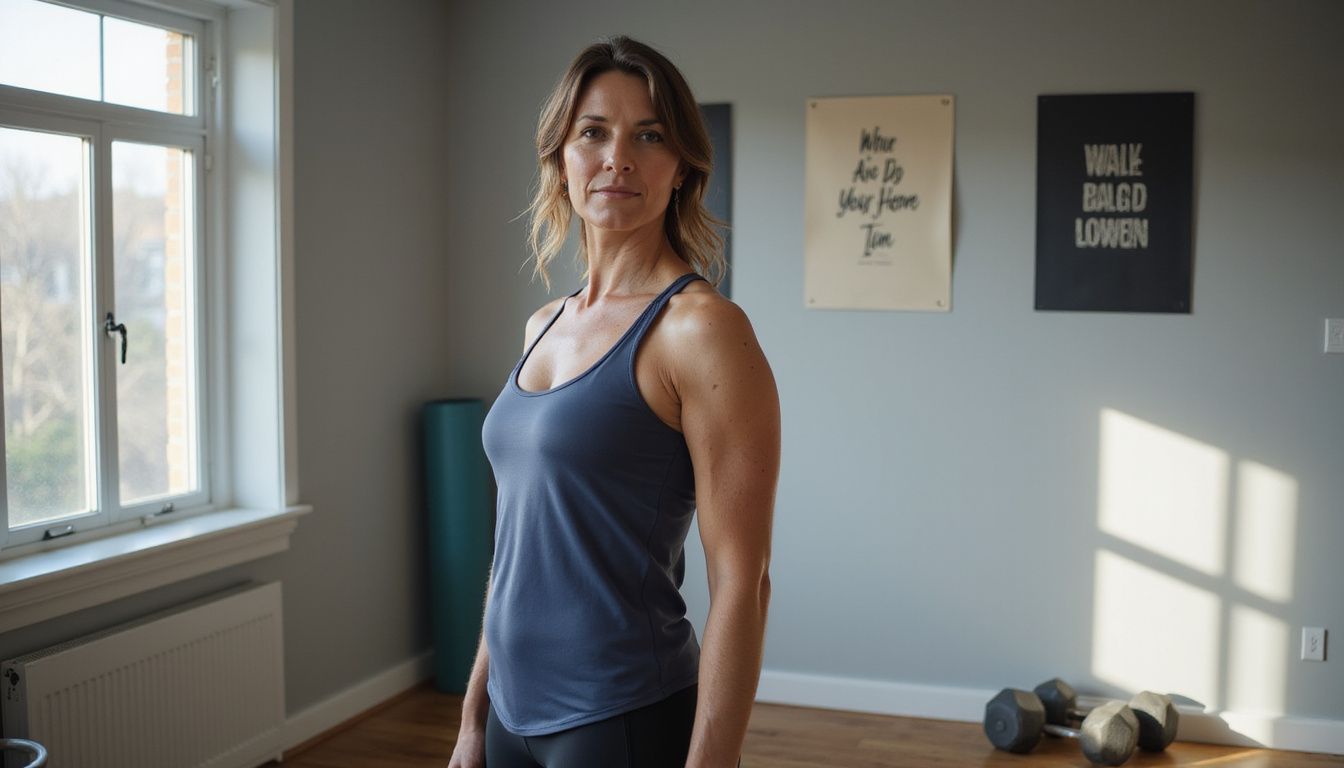Norah O’Donnell Weight Loss: CBS Anchor’s Remarkable Transformation From 172 To 132 Pounds
Our Nutrition Assistant AI Suite will transform your body. You will lose fat, get toned, and build muscle. Gain confidence and optimal health.
Losing weight and keeping it off is hard work. Norah O’Donnell weight loss shows what steady habits can do. The CBS anchor dropped 40 pounds, from 172 to 132 pounds, while managing a high-pressure schedule. In this article, you will learn the facts behind her food choices, exercise plan, mindset, and the practical steps that helped her maintain her results. Use her experience to guide your own health goals.
Key Takeaways
- Norah O’Donnell dropped 40 pounds, moving from 172 to 132 pounds, using a balanced diet and consistent exercise while anchoring CBS Evening News since 2019.
- A doctor’s warning about rising cholesterol and blood pressure sparked her wake-up call, leading to mindful eating and regular workouts.
- She combined strength training, yoga, and cardio, tracked meals, and focused on whole foods and portion control rather than restrictive diets.
- Major outlets, including People Magazine and CBS News, spotlighted her evidence-based approach, inspiring public support and conversations about self-care.
- A strong support system, plus guidance from nutrition and fitness professionals, helped her build sustainable habits and maintain progress.

Who is Norah O’Donnell
Norah O’Donnell is the anchor of CBS Evening News in the United States. You may recognize her as a trusted news presenter who interviews world leaders and covers major national stories.
She began her journalism career in the 1990s and joined CBS News in 2011. Norah has anchored the CBS Evening News since 2019 and also appears on 60 Minutes.
Many viewers admire her professionalism, resilience, and calm presence on air. As a public figure, she spends time in the spotlight and often faces pressure about appearance and well-being.
Her recent transformation, moving from 172 to 132 pounds, drew attention from fans and the media. Understanding why she pursued weight loss gives insight into her personal motivation.
Brief overview of her career
As anchor of CBS Evening News, you see Norah O’Donnell deliver breaking news and lead special coverage most nights. She started at NBC News in the late 1990s and reported from Congress, the White House, and disaster zones across the country.
In 2011, CBS named her chief White House correspondent. Viewers watched her ask direct questions and cover high-stakes political events.
She became one of the few women to lead a major network newscast in 2019. Her reporting often highlights health topics such as cancer awareness, stress management, and mental health that affect daily life.
Her staying power on screen, along with a focus on self-care, shows how consistent habits support both performance and well-being.
The public’s perception of her weight loss journey
Many people followed Norah O’Donnell’s weight loss journey closely. Fans praised how she shed 40 pounds while working in the public eye. Comments often noted her steady approach, including strength training, yoga, and consistent meal planning.
Viewers appreciated her focus on whole foods, lean proteins, fruits, vegetables, and portion control instead of strict or trendy diets. Her openness about past skin cancer also raised awareness that health scares can motivate lasting change.
Media coverage emphasized her mindful eating, goal setting, and long-term balance. For many, her transformation became a spark to prioritize health, lower stress, and prevent burnout through physical activity.
People who have struggled with weight or demanding jobs found her example relatable and motivating. It encouraged conversations about self-worth, perseverance, and healthy habits that last.
Motivation for Weight Loss

Every major change starts with a clear reason. Norah O’Donnell’s turning point pushed her to protect her health and simplify her habits.
Personal and health related reasons
Personal health concerns can be powerful motivators. Norah’s doctor flagged rising cholesterol and blood pressure, which raised her risk for heart disease. Acting early can prevent serious problems later.
- High cholesterol and hypertension affect tens of millions of U.S. adults each year [Centers for Disease Control and Prevention, CDC].
- Weight loss of 5 to 10 percent can improve blood pressure, cholesterol, and blood sugar in many people [CDC].
Mindfulness, which means paying attention to your choices and hunger cues, helped her regain energy and confidence. Regular check-ins with health professionals kept her plan safe and on track.
As she put it, caring for your health first supports everything else. The goal is not just a lower number on the scale. It is eating balanced meals with whole grains, healthy fats, and lean proteins, and building a lifestyle you can maintain.
Impact on her life and career
Better health often boosts daily performance. Norah’s physical changes increased her energy on air, and viewers noticed. Inside CBS, colleagues saw how consistent training helped her manage stress on busy news days.
Steady habits can open doors in your own life too. Feeling stronger and more focused can make tough days easier. Small improvements stack up and build confidence over time.
Changes in Diet
Food choices shaped much of Norah’s progress. She focused on whole foods, mindful portions, and simple planning that fits a busy life.
Overview of dietary adjustments
Healthy eating does not need to be complicated. Prioritize vegetables, fruits, lean protein, and whole grains. Limit added sugar, refined snacks, and foods high in saturated fat.
Some people use a splash of apple cider vinegar in dressings for flavor with few calories. Early research suggests it may curb appetite for some individuals, though results vary. Keep your focus on balanced meals and consistency.
Portion awareness matters even with healthy foods. Tracking meals for a week can reveal patterns you did not notice. Planning ahead, as Norah did, makes weekday choices easier and reduces impulsive eating.
In my case, swapping soda for unsweetened apple cider and water helped my energy and reduced afternoon slumps. Simple changes can add up over months.
Focus on balanced meals and portion control
Balanced plates help you feel full and fueled. A common guide is half vegetables, one quarter lean protein like chicken, fish, or tofu, and one quarter whole grains such as brown rice or oats.
Try smaller plates if you tend to over-serve. This makes portions look satisfying without extra calories. Measuring a few meals can also reset your eye for serving sizes.
Variety supports both physical and mental health. You get more nutrients, meals stay interesting, and cravings become easier to manage.
Exercise Routine
Movement was the second pillar of Norah’s transformation. A simple plan with strength, cardio, and flexibility can deliver steady results.
Types of workouts she engaged in
Norah mixed strength training, cardiovascular exercise, and yoga. She worked with a personal trainer to build weightlifting sessions and brisk walks with intervals. This approach supports muscle, heart health, and stress control.
- Strength training at least 2 to 3 days per week helps build muscle and supports long-term fat loss [Harvard Medical School].
- Low-impact cardio like cycling or swimming is gentle on joints and strengthens the heart.
- Yoga improves flexibility and may reduce cortisol, the body’s main stress hormone.
Tracking progress, such as sets, reps, or walking minutes, offers a sense of momentum. Trying new formats keeps workouts interesting and builds skills over time.
One quick example: alternating one minute of fast walking with one minute easy for 20 minutes can lift your heart rate without long runs.
The importance of consistency and routine
Consistency turned small actions into big change. Norah scheduled regular meals and exercise, which reduced decision fatigue and late-day snacking.
People who follow a weekly plan for eating and activity have higher odds of keeping weight off in the long run, according to large behavior studies. Routines create fewer choices and more wins.
Over time, habits feel automatic. Energy improves, moods stabilize, and progress stays steady even during busy weeks.
Overcoming Challenges
Every weight loss journey has tough moments. The key is recognizing hurdles early and using simple tools to move past them.
Emotional and physical hurdles faced
Public pressure and personal expectations can weigh on anyone. Slow changes on the scale may trigger doubt or frustration. Media comments about appearance can also sting.
Physical challenges show up too. Early workouts can leave you sore. Cravings may rise as your routine shifts. These are normal signs of change, not failure.
Norah faced these hurdles while working live on television. What helped was consistency, balanced meals, and focusing on health markers, not just weight.
Strategies for staying motivated and overcoming setbacks
Start with clear goals you can measure. Break them into weekly targets like three strength workouts or five home-cooked dinners. Track what you do, not only your weight.
- Keep a short log of meals, workouts, and sleep. Patterns reveal what helps.
- Build a support circle for encouragement and accountability.
- After a setback, reset at the next meal or next workout. Do not wait for Monday.
- Talk with a qualified clinician if progress stalls or stress rises.
Flexibility matters. Adjust portions, try a new workout, or plan an earlier bedtime. Small changes protect your momentum.
Support System and Resources
People and guidance shape your habits. A strong support system can turn good intentions into daily action.
Influence of family and friends
Social support raises the odds you will stick with a plan. Loved ones can nudge you to cook at home, go for a walk, or skip late snacks.
Norah leaned on her close circle for encouragement and accountability. Group workouts, recipe swaps, or shared step goals make the process more enjoyable.
Research in nutrition behavior shows peer support can improve long-term weight management. Celebrate small wins together to keep motivation high.
Professional guidance from nutritionists or trainers
Experts can tailor a plan to your health, preferences, and schedule. A registered dietitian teaches portion strategies, meal structure, and how to meet nutrient needs. Certified trainers create safe routines and adjust intensity as you get stronger.
Regular check-ins improve follow-through and help you solve problems early. Studies show that people using expert support often lose more weight and maintain it longer.
If you have medical conditions or take prescriptions, talk with your clinician before changing diet or exercise.
Maintaining Weight Loss
Keeping the weight off requires simple habits that you can repeat for years. Think of maintenance as practicing the basics well.
Strategies for sustaining a healthy weight long-term
Build a routine you can live with. Eat mostly vegetables, fruits, whole grains, and lean protein. Keep portions steady, even on weekends.
- Aim for at least 150 minutes of moderate activity each week, such as brisk walking, per CDC guidance.
- Use a food or activity app for light tracking. Awareness drives better choices.
- Plan for treats in small amounts, which reduces cravings and keeps you on track.
- Share goals with a friend or group for ongoing support.
Adjust as life changes. The core habits stay the same, but meal timing or workout types can shift with your schedule.
Importance of lifestyle changes
Short-term diets fade. Lifestyle changes last. Cooking more at home, moving daily, drinking water, managing stress, and getting enough sleep all support weight maintenance.
Treat these habits as permanent, not temporary. That mindset lowers the chance of regaining weight and keeps health markers moving in the right direction.
Public and Media Response
Norah’s transformation sparked wide interest. Coverage highlighted balanced methods and steady progress, not quick fixes.
Coverage in the media
Major outlets, including People Magazine and CBS News, reported on her path from 172 to 132 pounds. Stories focused on realistic goals, balanced nutrition, and regular exercise with guidance from qualified experts.
Oprah Daily also shared interviews in which Norah described how setting clear, measurable goals helped her stay consistent. Social platforms amplified support from viewers who valued her transparency about body image and health.
These reports stressed behavior change and self-care over fad approaches, which aligns with public health guidance.
Public reaction and support from fans and followers
Audience response was largely positive. Many people shared that her progress encouraged them to try simple steps like walking daily or cooking more meals at home.
Messages often focused on resilience, discipline, and a healthier relationship with the scale. The conversation shifted from appearance to sustainable habits.
Final Thoughts
Stories like Norah O’Donnell’s can boost your belief that steady habits work. Her path underscores how small choices, repeated often, change health and confidence.
Reflection on her journey and its impact
The visible change on screen reflects deeper gains in energy and well-being. Losing 40 pounds improved her health profile and showed viewers that long-term change does not require extremes.
Her experience highlights the value of support, planning, and patience. Those same tools can improve your daily life as well.
Encouragement for others embarking on a weight loss journey
Starting can feel uncertain, yet progress grows with simple, consistent steps. Set realistic goals, track actions, and seek support when needed.
As Norah showed, dedication and routine lead to results. Over time, you will likely notice better energy, mood, and overall health.
Conclusion
Norah O’Donnell’s weight loss journey shows how a balanced diet, consistent exercise, and strong support can lead to lasting change. Use these principles to shape your own plan and protect your health. Small choices, made daily, create powerful results.
Health disclaimer: This article is for education only and is not medical advice. Talk with your healthcare professional before changing your diet or exercise, especially if you have medical conditions or take medications.References: Centers for Disease Control and Prevention (CDC) Physical Activity Guidelines and weight management resources; Harvard Medical School strength training guidance; media reports from People Magazine, CBS News, and Oprah Daily.
FAQs
1. What steps did Norah O’Donnell take to achieve her weight loss and improve her overall health and wellness?
Norah O’Donnell focused on balanced nutrition, regular physical activity, and consistent routines. She made informed food choices and prioritized her overall health and wellness throughout her journey.
2. How much weight did Norah O’Donnell lose, and over what period did this transformation occur?
Norah O’Donnell reduced her weight from 172 pounds to 132 pounds. Reports indicate this transformation took place over several months, reflecting a steady and sustainable approach to overall health and wellness.
3. What impact did Norah O’Donnell’s weight loss have on her overall health and wellness?
Her weight loss improved her energy, confidence, and physical well-being. She reported better sleep and increased stamina, which contributed to her overall health and wellness.
4. Are there any lessons from Norah O’Donnell’s experience that can help others seeking better overall health and wellness?
Norah O’Donnell’s experience shows that setting realistic goals, staying consistent, and focusing on long-term habits can support lasting improvements in overall health and wellness. Her story highlights the importance of patience and commitment.







